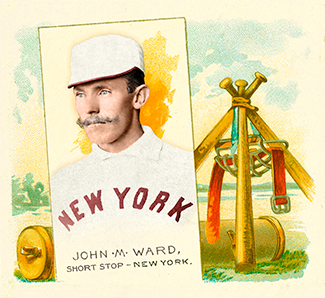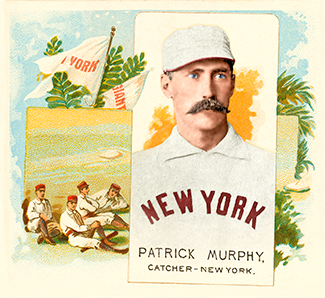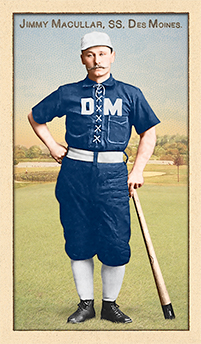
- Series: Beginnings: 1880's
- City: Des Moines
- Team: Prohibitionists
- League: Western Association
James F. Macullar (1855-1924) was a scrappy fellow with several noteworthy accomplishments. At a mere 5'6” Little Mac did not cut an imposing figure when he arrived in major league baseball by virtue of his Syracuse Stars being promoted into the National League in 1879. Macullar was the rare natural left-hander to bat right-handed, but any advantage accruing wasn't obvious as he generally hovered around the .200 mark at bat. It was in the field that he distinguished himself. By the end of his career, Macullar had set a record that still stands by playing more games (325) at shortstop than any other southpaw. That rookie season also saw Jimmy demonstrate leadership beyond his years when the twenty-four year old was given the management of the Stars for about a month. His weak hitting left him unemployed for a couple of years, but that didn't deter him from baseball. He and teammate Hick Carpenter headed to Cuba in the winter of '79-80 and became the first North Americans to play for the new league when they were signed by Colón. Despite Jimmy's limitations, he and Hick far outclassed the fledgling Cuban players and were so dominant that other teams refused to play against them. Macullar was hired by the new American Association's Cincinnati franchise in '82 and played stellar centerfield for the pennant-winners with his buddy Carpenter at third. The next season he was relegated to a utility role and his poor offensive production led to his demotion. Picked up by the Orioles, Jimmy saw regular action back at short through the 1886 season.
- Baltimore became Macullar's home and he served the city as a jailer over the next two decades.
- Jimmy contributed an outstanding play in centerfield to nail the White Sox' Abner Dalrymple at home to end the Reds' first post-season contest on October 6, 1882
- Macullar's uniform color on this card was changed in July, 2017 from black to blue to reflect recent reliable research by Craig Brown & friends at Threads of Our Game. One card was previously released featuring a black uniform.
- Series: 1888 Champion New York Giants
- City: New York
- Team: Giants
- League: National League
- Hall: National Baseball Hall of Fame
“Monte” Ward (1860-1925). An elite pitcher and an excellent batsman, Ward also earned a law degree, formed sports’ first labor union, and helped create the Player’s League to challenge the reserve clause – all before the age of 30.
- 3x National League Pennant winner
- Only player: 100 wins/2,000 hits
- Pitched 2nd perfect game in history, June 17, 1880
- Elected to Hall of Fame: 1964
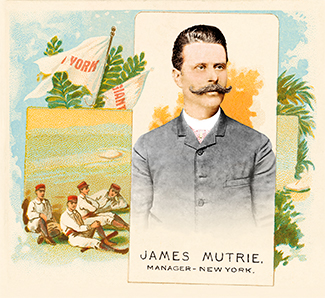
- Series: 1888 Champion New York Giants
- City: New York
- Team: Giants
- League: National League
James J. Mutrie (1851-1938) was a giant among early baseball entrepreneurs. He may rightly be known as the father of New York baseball, is second only to Joe McCarthy in manager winning %, won pennants in two leagues, helped create (and won) the first true inter-league run-up to the “world series” and popularized the nickname for his Manhattan “Gothams” by referring to his burly lads as “my Giants!” Along the way, “Truthful James” (a wry sobriquet given by the immortal Father Henry Chadwick) stirred controversy at nearly every turn, risked all and in the end, lost. Yet he was beloved by his players and for decades was revered in the Big Apple as the man who truly brought the game to its biggest stage. He and partner John Day audaciously brought two new NY entries into the city: the AA’s Metropolitans and what would become the National League’s Polo Grounds-dwelling Giants who triumphed in the first two post-season tournaments. Done in by the Players’ League rebellion and ensuing financial pressures, Mutrie was forced from the game in 1892.
- Mutrie prospered by raiding AA players for his NY club and paid the price when his top talent defected a decade later to the PL
- Series: 1888 Champion New York Giants
- City: New York
- Team: Giants
- League: National League
Patrick J. Murphy (1857-1927) was a right-handed catcher for the New York Giants from 1887-1990. This Massachusetts native had a career batting average of .220 and hit one home run in the “Dead Ball” era. He played in one “world series” in 1888, going one for 10 and scoring a run in three games against the St Louis Browns. The Giants prevailed six games to four. The contest was marked by the great future Hall of Famer Tim Keefe’s four victories over the Browns.
- Murphy was a grizzled 30 years of age when he broke in with the Giants
- Murphy’s sole hit in the ’88 series was good for an RBI
- In 1889 Murphy’s salary was $1800
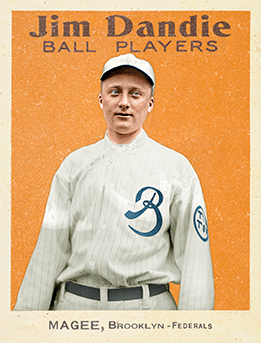
- Series: Jim Dandie Feds
- City: Brooklyn
- Team: Tip-Tops
- League: Federal League
Leo Christopher Magee (1889-1966) started his major league career in dramatic fashion as he and his Cardinal teammates helped rescue dozens of fellow passengers when their train wrecked in Connecticut. His manager Roger Bresnahan liked what he saw despite Magee's weak hitting, putting him in for the injured Miller Huggins at second and then moving him to left where he acquired the nickname “Flash.” Magee finished that 1911 season with a much improved batting average--.290--good for third on the team. Leo was a hothead, encountering numerous run-ins with umpires, squabbling with management over salary and even getting ejected mid-game for fighting—with teammate Ted Cather. Nevertheless, or perhaps because of his fiery style, John McGraw chose Magee as a member of a world-tour exhibition competing with Charles Comiskey's American Leaguers. He showed his flair for the dramatic could work on the field in a match in Medford, OR, when in pouring rain, he glided toward the line in left to make a grab while carrying an umbrella. The teams ended their circumnavigation of the globe aboard the Lusitania after their last games in England in March 1914. He was courted by the new Federal League Chicagos but remained with Mordecai Brown's Terriers for a fine season before finally jumping to the Brooklyn Tri-Tops in '15 where he also became, at 25, one of the youngest managers. He wasted no time demonstrating his temper, getting ejected in the first inning of the home opener. The experiment of trying such a youngster in the pilot's role failed as Lee's tough style alienated his veteran players and fans alike. His skill at bat and afield caused old mate Huggins, now managing the Yankees, to bring Magee aboard for the 1916 season. Huggins termed Lee “the prize of the Federal League collection.” Salary disputes, unsavory associations and union activity all combined to cast a long shadow over Magee's latter years. Finally, in 1919, he was ousted from the game with Hal Chase for allegations of throwing a game.
- Despite a fine career average of .276 in nine seasons, Magee's tenure ended ignominiously due to a jury verdict that proved the precursor to MLB's crusade against gambling which culminated the next year in the Black Sox affair

